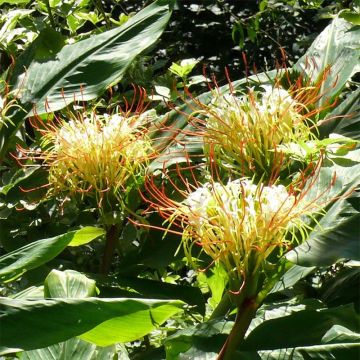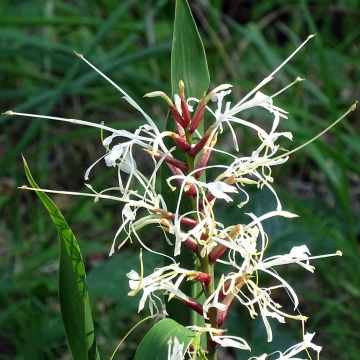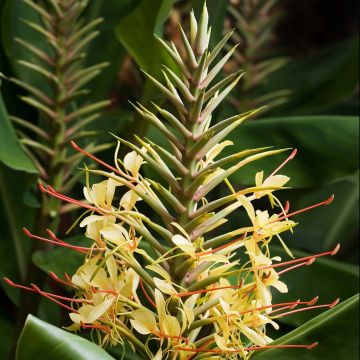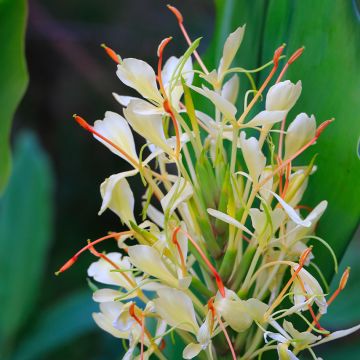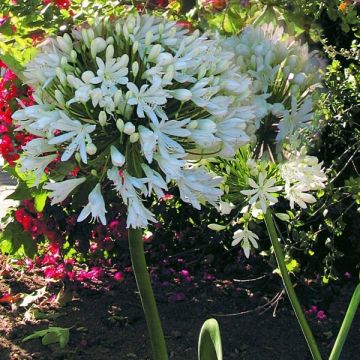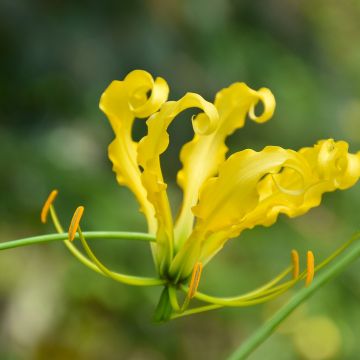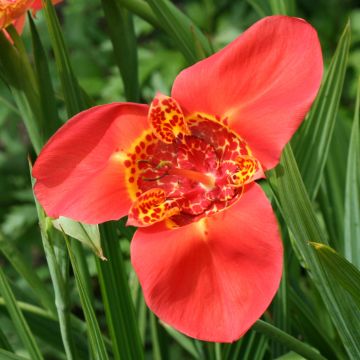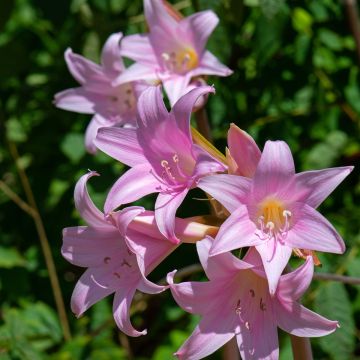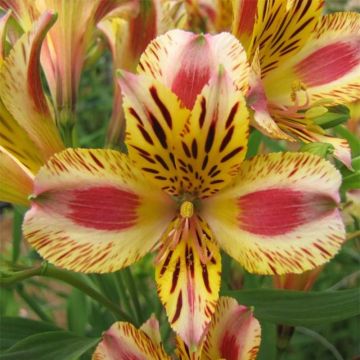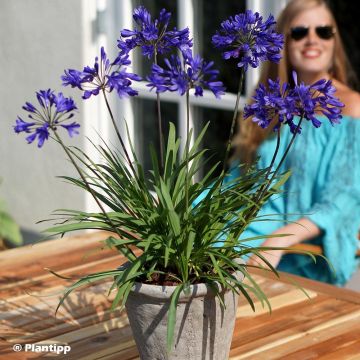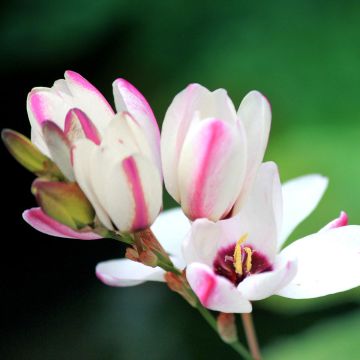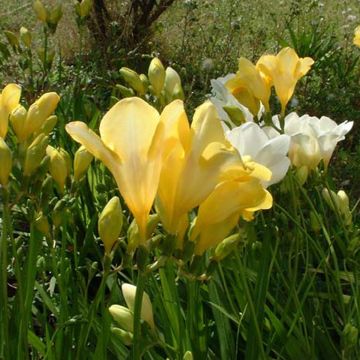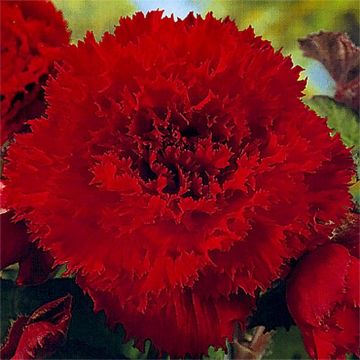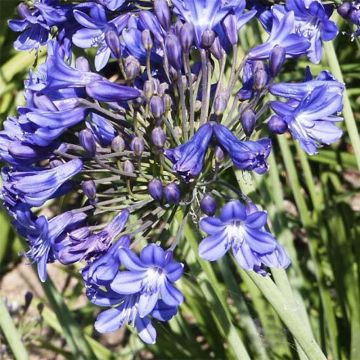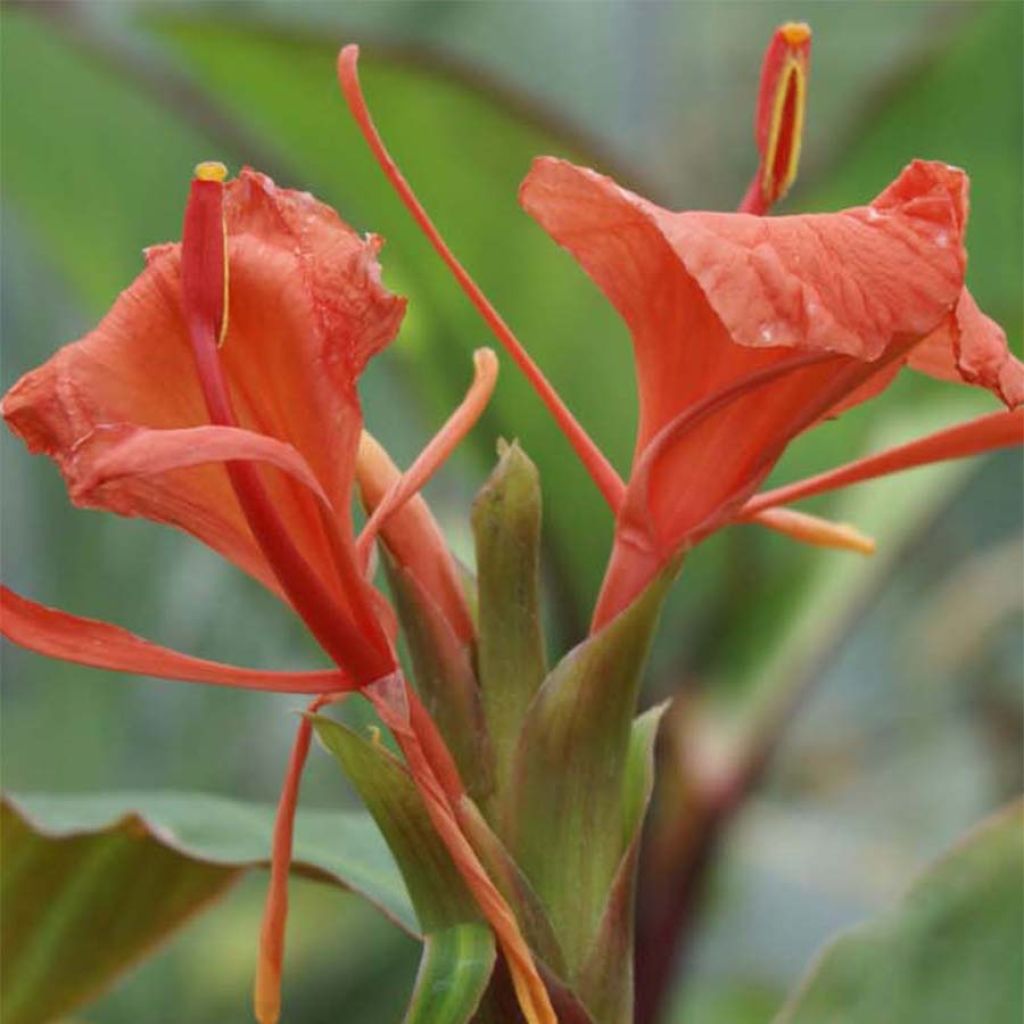

Hedychium greenii - Coral Ginger
Hedychium greenii - Coral Ginger
Hedychium greenii
Red Butterfly Lily, Garland Flower, Ginger Lily
This item cannot be shipped to the selected country
Delivery charge from €5.90
More information
Schedule delivery date,
and select date in basket
This plant carries a 6 months recovery warranty
More information
We guarantee the quality of our plants for a full growing cycle, and will replace at our expense any plant that fails to recover under normal climatic and planting conditions.
From €5.90 for pickup delivery and €6.90 for home delivery
Express home delivery from €8.90.
Does this plant fit my garden?
Set up your Plantfit profile →
Description
The Hedychium greenii, also known as Coral Ginger, is a botanical species with a small stature, quite different from the others. This ornamental ginger develops beautiful brown stems tinged with red that bear large leaves of a shiny green-grey colour with a red-purple underside, particularly ornamental. Its late summer flowering consists of short heads of large variegated flowers in shades of red, orange, and salmon pink, a hue reminiscent of coral. It perfectly harmonises with the colours of its vegetation. This unusual plant also produces tiny seedlings on the old flower heads, which the wind disperses. A plant to be used without moderation in a garden of exotic inspiration, spectacular in a large pot on the terrace, to be stored away in winter.
The Hedychium greenii, sometimes spelt greenei, is a rhizomatous and non-spreading plant belonging to the family Zingiberaceae, just like the ginger we sometimes use in cooking. This plant is native to the forests covering the foothills of the Himalayas in Bhutan and the Northeast of India. It is found up to 1300m (4265ft) altitude on humus-rich soils, rich in organic matter, but well-drained.
This coral ginger forms a beautiful clump of leafy stems from April onwards, which, in our climates, will rarely exceed 1.20m (4ft) in height and 70-80cm (28-32in) in width. It anchors itself with vigorous rhizomes that tend to emerge from the ground, weakening the stump against severe frosts. Flowering takes place in September-October, at the tips of the stems, in the form of small conical clusters composed of 5 or 6 flowers, 7cm (3in) long, sometimes fragrant, somewhat resembling those of gauras with their structure consisting of small petals surrounding prominent stamens. Their colour is a unique blend of salmon, orange, and red, accentuating the red tones on the stems and leaves. They attract many bees but curiously never produce seeds in cultivation. All cultivated plants seem to be derived from a single individual, collected before 1908 by M. Green, and grown. Multiplied only by the removal of seedlings, this specimen may have lost its fertility. Attempts to find this plant in its original location have been unsuccessful, leaving the mystery unresolved.
Cultivate ornamental gingers in large pots where winter frosts are severe by planting three plants per 25 cm (10in) pot. Hedychium greenii, still capable of withstanding winter temperatures around -10 to -12°C, provided with healthy soil and winter protection on the stump, can be cultivated without particular difficulties in coastal areas, for example, but away from the scorching sun. In the garden, a tropical-inspired bed can be created by associating, for instance, Hedychium greenii with a Chinese palm tree or a Japanese banana tree against a backdrop of giant canna. The ornamental ginger can be planted near a water source in mild climates, as it also appreciates waterlogged soils during its growing season. In a coastal garden, it will accompany the flowering of abutilons, Cassia, Lantana, brugmansia, or even the lesser-known Iochroma cyaneum.
Report an error about the product description
Hedychium greenii - Coral Ginger in pictures
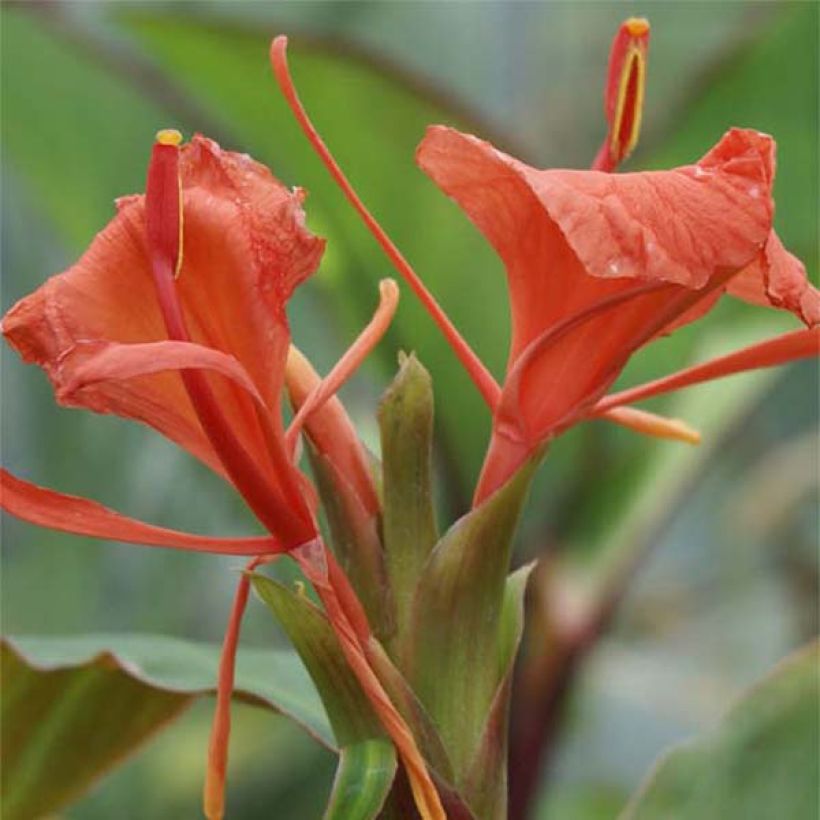



Plant habit
Flowering
Foliage
Botanical data
Hedychium
greenii
Zingiberaceae
Red Butterfly Lily, Garland Flower, Ginger Lily
India
Other Hedychium
Planting and care
Hedychiums are plants known for their non-hardy nature due to their poor cold resistance. Hedychium greenii is a relatively hardy variety capable of withstanding temperatures as low as -10/-12 °C under a thick protective mulch. We leave the stumps in the ground for about 9 to 10 years, and none have died. At the first frost, we cut back the foliage to the ground and then mulch the stumps with a thick layer of dead leaves. This has always been sufficient so far. The stump can also be dug up and treated like cannas. Choose a warm and partially shaded location, sheltered from strong winds. In full sun, the foliage tends to burn. The soil should remain moist, even damp, throughout the growing season but relatively dry in winter. A rich, deep, and well-drained soil is best suited. Growing in large containers is possible. In this case, the plant will be stored frost-free in a bright and unheated room during winter. Watering will be reduced in winter and abundant from spring to summer.
Stumps shipped in pots only from March to May.
Planting period
Intended location
Care
This item has not been reviewed yet - be the first to leave a review about it.
Bulbs to grow in pots
Haven't found what you were looking for?
Hardiness is the lowest winter temperature a plant can endure without suffering serious damage or even dying. However, hardiness is affected by location (a sheltered area, such as a patio), protection (winter cover) and soil type (hardiness is improved by well-drained soil).

Photo Sharing Terms & Conditions
In order to encourage gardeners to interact and share their experiences, Promesse de fleurs offers various media enabling content to be uploaded onto its Site - in particular via the ‘Photo sharing’ module.
The User agrees to refrain from:
- Posting any content that is illegal, prejudicial, insulting, racist, inciteful to hatred, revisionist, contrary to public decency, that infringes on privacy or on the privacy rights of third parties, in particular the publicity rights of persons and goods, intellectual property rights, or the right to privacy.
- Submitting content on behalf of a third party;
- Impersonate the identity of a third party and/or publish any personal information about a third party;
In general, the User undertakes to refrain from any unethical behaviour.
All Content (in particular text, comments, files, images, photos, videos, creative works, etc.), which may be subject to property or intellectual property rights, image or other private rights, shall remain the property of the User, subject to the limited rights granted by the terms of the licence granted by Promesse de fleurs as stated below. Users are at liberty to publish or not to publish such Content on the Site, notably via the ‘Photo Sharing’ facility, and accept that this Content shall be made public and freely accessible, notably on the Internet.
Users further acknowledge, undertake to have ,and guarantee that they hold all necessary rights and permissions to publish such material on the Site, in particular with regard to the legislation in force pertaining to any privacy, property, intellectual property, image, or contractual rights, or rights of any other nature. By publishing such Content on the Site, Users acknowledge accepting full liability as publishers of the Content within the meaning of the law, and grant Promesse de fleurs, free of charge, an inclusive, worldwide licence for the said Content for the entire duration of its publication, including all reproduction, representation, up/downloading, displaying, performing, transmission, and storage rights.
Users also grant permission for their name to be linked to the Content and accept that this link may not always be made available.
By engaging in posting material, Users consent to their Content becoming automatically accessible on the Internet, in particular on other sites and/or blogs and/or web pages of the Promesse de fleurs site, including in particular social pages and the Promesse de fleurs catalogue.
Users may secure the removal of entrusted content free of charge by issuing a simple request via our contact form.
The flowering period indicated on our website applies to countries and regions located in USDA zone 8 (France, the United Kingdom, Ireland, the Netherlands, etc.)
It will vary according to where you live:
- In zones 9 to 10 (Italy, Spain, Greece, etc.), flowering will occur about 2 to 4 weeks earlier.
- In zones 6 to 7 (Germany, Poland, Slovenia, and lower mountainous regions), flowering will be delayed by 2 to 3 weeks.
- In zone 5 (Central Europe, Scandinavia), blooming will be delayed by 3 to 5 weeks.
In temperate climates, pruning of spring-flowering shrubs (forsythia, spireas, etc.) should be done just after flowering.
Pruning of summer-flowering shrubs (Indian Lilac, Perovskia, etc.) can be done in winter or spring.
In cold regions as well as with frost-sensitive plants, avoid pruning too early when severe frosts may still occur.
The planting period indicated on our website applies to countries and regions located in USDA zone 8 (France, United Kingdom, Ireland, Netherlands).
It will vary according to where you live:
- In Mediterranean zones (Marseille, Madrid, Milan, etc.), autumn and winter are the best planting periods.
- In continental zones (Strasbourg, Munich, Vienna, etc.), delay planting by 2 to 3 weeks in spring and bring it forward by 2 to 4 weeks in autumn.
- In mountainous regions (the Alps, Pyrenees, Carpathians, etc.), it is best to plant in late spring (May-June) or late summer (August-September).
The harvesting period indicated on our website applies to countries and regions in USDA zone 8 (France, England, Ireland, the Netherlands).
In colder areas (Scandinavia, Poland, Austria...) fruit and vegetable harvests are likely to be delayed by 3-4 weeks.
In warmer areas (Italy, Spain, Greece, etc.), harvesting will probably take place earlier, depending on weather conditions.
The sowing periods indicated on our website apply to countries and regions within USDA Zone 8 (France, UK, Ireland, Netherlands).
In colder areas (Scandinavia, Poland, Austria...), delay any outdoor sowing by 3-4 weeks, or sow under glass.
In warmer climes (Italy, Spain, Greece, etc.), bring outdoor sowing forward by a few weeks.

































